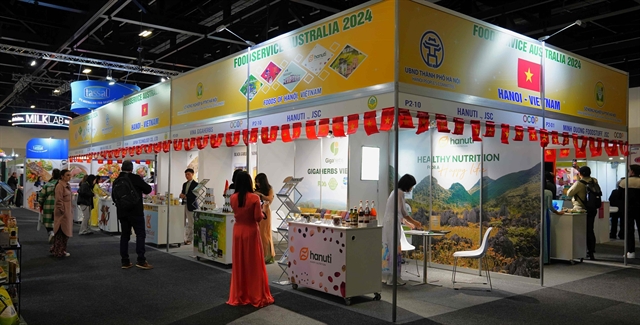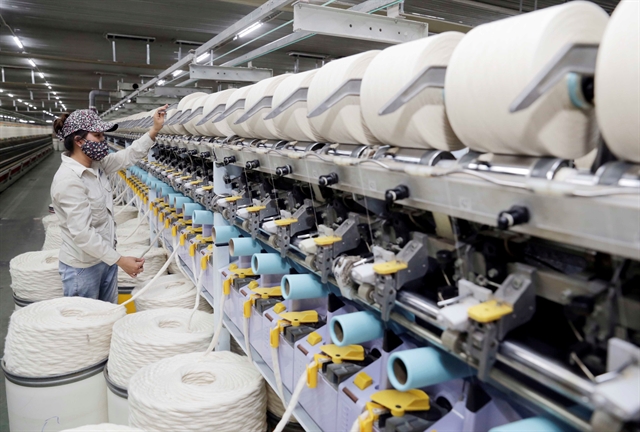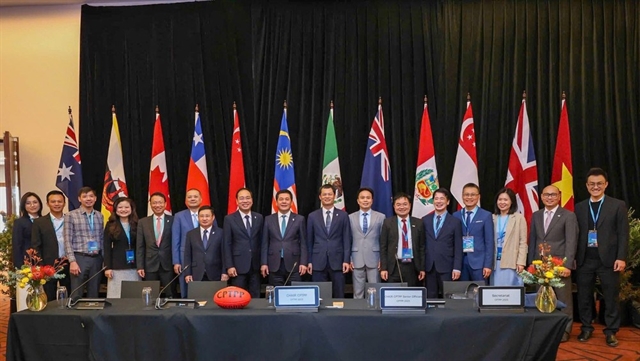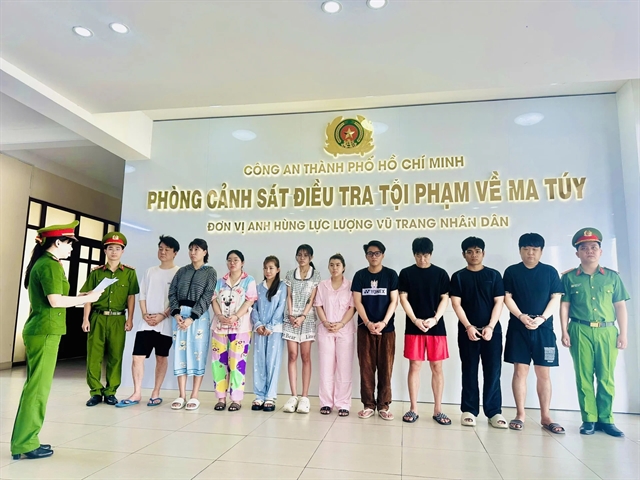 Economy
Economy

 |
| The booths introducing Vietnamese goods at the Foodservice Australia Fair 2024. VNA/VNS Photo |
As global markets remain volatile and unpredictable, Vietnamese enterprises are placing high expectations on trade promotions and export strategies to help them navigate ongoing challenges.
The newly issued directive of Prime Minister Phạm Minh Chính, called Directive 18, on solution to promote trade lays out a strategic framework aimed at invigorating domestic and foreign trade promotion in 2025, signalling a robust governmental commitment to economic recovery and sustainable development.
Directive 18, issued on June 18, 2025, focuses on a transition from broad-based trade promotion to a more focused, in-depth approach. Its objective is to increase the market share of Vietnamese goods in both traditional markets and those with free trade agreements (FTAs).
Domestically, the emphasis is placed on strengthening the internal market as a key pillar of economic resilience.
The Ministry of Industry and Trade (MoIT) has also issued a decision to make a detailed action plan to implement Directive 18.
The plan underscores the importance of promoting diverse, high-impact trade initiatives tailored to key international markets like the EU, the US, China, Japan, South Korea, and ASEAN nations.
One of the ministry’s priorities is to strengthen the implementation of trade promotion programmes for Vietnamese products in both established and emerging markets.
In addition to targeting regions with established FTAs, the plan includes strategic expansion into niche and high-potential markets such as the halal segment -- Saudi Arabia, Egypt and the UAE. Key industries targeted for promotion include high-tech sectors like semiconductors, artificial intelligence, automation, machinery, and renewable energy.
These efforts are aimed at positioning Việt Nam not just as a manufacturing hub but also as a key player in advanced technology supply chains.
Meanwhile, the Trade Promotion Agency is tasked with coordinating cross-sectoral efforts and organising national-scale events like Vietnam International Sourcing 2025, a flagship initiative designed to connect Vietnamese firms with international buyers, retailers and distributors.
The MoIT’s Import-Export Department has been directed to provide enterprises with timely updates on trade policies, consumer trends and technical regulations in FTA markets.
Seminars and training will be organised to help businesses fully exploit tariff incentives and comply with international standard, particularly in terms of traceability, environmental compliance and labour regulations.
Minister of Industry and Trade Nguyễn Hồng Diên has also stressed the need to assess bilateral trade balances with major partners such as the US, the EU and China, and to identify opportunities for expanding exports of high value-added goods.
The MoIT’s Department of Foreign Market Development will play a crucial role in building a dynamic export market database. It will coordinate with trade offices abroad and international trade bodies to monitor and analyse developments in tariffs, quality standards and sustainability requirements across markets in the EU, North America, Asia and beyond.
Domestically, the ministry’s Department of Domestic Market Management and Development will focus on campaigns, such as 'Vietnamese giving priority to Vietnamese goods', integrating them with broader promotional schemes to boost domestic consumption.
Local trade fairs and promotional events will bring Vietnamese products to remote, rural, and economically disadvantaged areas. The strategy aims at enhancing the visibility and accessibility of local brands across the country.
Digital commerce is another critical pillar of the action plan. The Department of E-commerce and Digital Economy will spearhead collaborations with major e-commerce platforms to boost Vietnamese products online.
Through cross-border e-commerce and regional integration, these programmes aim to accelerate the digital transformation of Vietnamese enterprises and improve their competitiveness in both domestic and international markets.
Enterprise opinions
Business leaders have largely welcomed Directive 18 as a timely and strategic intervention.
Lý Kim Chi, chairwoman of the HCM City Food and Foodstuff Association, said that the directive provided necessary guidance in protecting the authenticity of Vietnamese goods, combating counterfeiting and leveraging digital transformation.
"However, enterprises need a detailed action plan announced at the beginning of the year – what products, which markets, the type of support available and the financial terms,” she said.
This would enable businesses to plan proactively instead of reacting passively due to information gaps, she added.
Chi also noted the importance of aligning import policies with export strategies. Without a well-thought-out sourcing strategy for raw materials and components, Vietnamese exports could lose competitiveness in global markets.
“Supporting small and medium-sized enterprises through financial policies and structured guidance is essential for trade promotion efforts to be truly effective,” she said.
Nguyễn Văn Mười, deputy general secretary of the Vietnam Fruit and Vegetable Association, said that despite progress in trade promotion by the MoIT and the Ministry of Agriculture and Environment, budget limitations had restricted participation.
“Our association can only join two trade promotion programmes a year, which is insufficient for the number of member businesses we represent,” Mười said.
The volatility in China – a market that once consumed 64 per cent of Việt Nam’s fruit and vegetable exports – underscored the urgency of diversification. Durian exports, for instance, had seen a sharp decline due to stricter quality control.
So, “trade promotion alone is not enough. Quality is key,” he said, citing a dramatic market share loss in China to competitors like Thailand.
 |
A yarn production line at Hà Nam Textile Co Ltd. The textile and garment industry needs to build domestic material supply chains. VNA/VNS Photo |
In the textile industry, Phạm Văn Việt, vice chairman of the HCM City Textile, Embroidery and Knitting Association, highlighted the importance of building domestic supply chains.
“To build strong national brands, we must first be proactive in raw material sourcing,” Việt said.
He stressed that while many businesses were trying to explore new markets like Australia and Canada, the process was slow and would require strategic, long-term support from the Government.
He also called for more structured financial and technical support to help enterprises comply with FTA requirements and boost their competitiveness.
The effectiveness of this directive will depend on seamless coordination between central agencies, trade offices abroad, local departments and the business communities.
With full implementation, Directive 18 could be a turning point in helping Vietnamese enterprises overcome global challenges and build long-term economic resilience in 2025 and beyond. VNS




